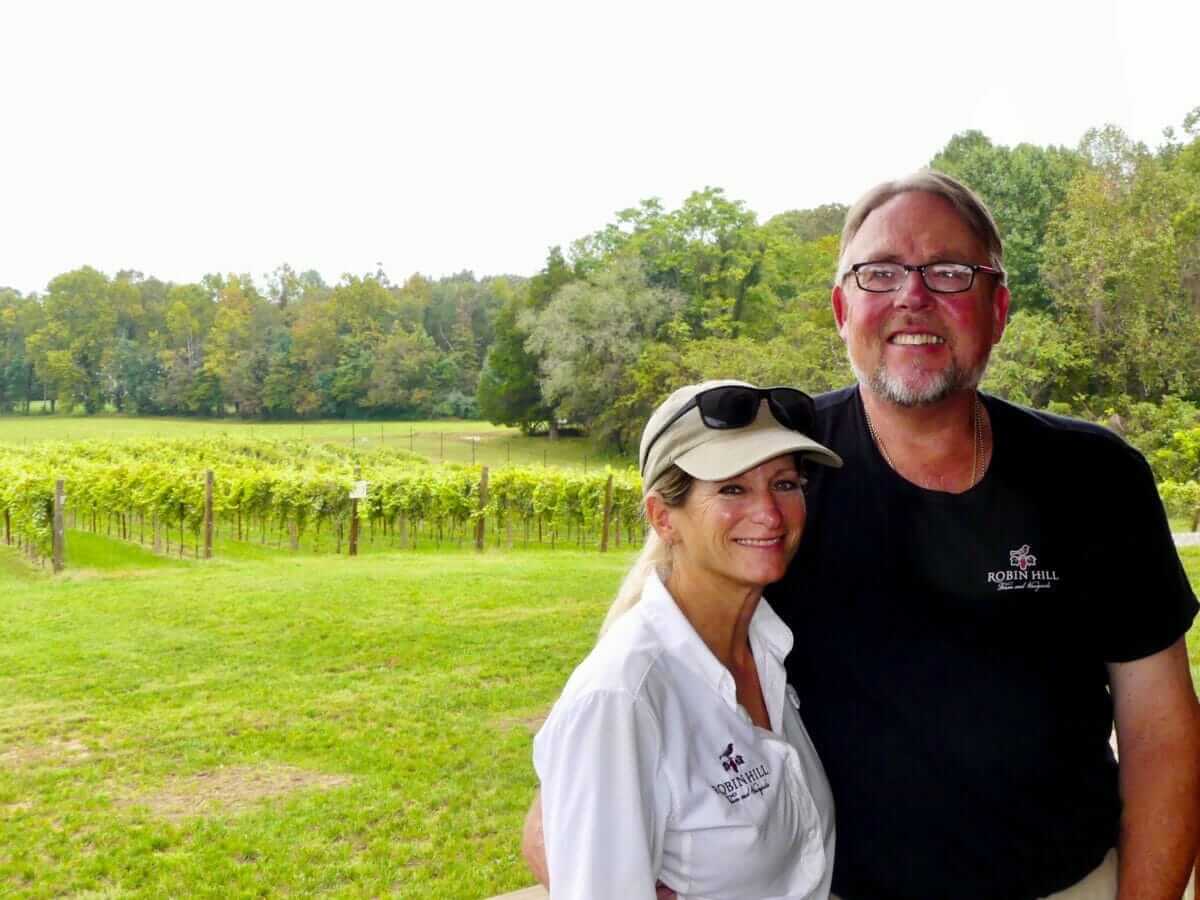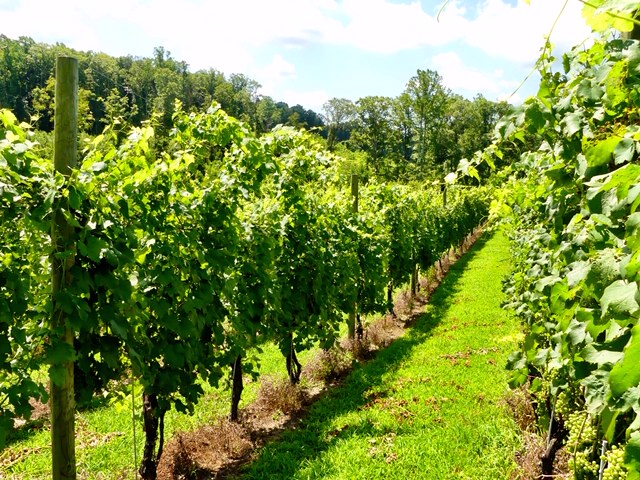Grapevines Sprout Where Tobacco Once Grew in Southern Maryland
At least 14 wineries have opened in the years since the national tobacco settlement in 1998.
Grapevines Sprout Where Tobacco Once Grew in Southern Maryland
At least 14 wineries have opened in the years since the national tobacco settlement in 1998.

Susan Watson-White and her husband, Bob White, grow grapes where they once cultivated tobacco in Brandywine, Md.by Lisa Snider
Susan Watson-White earned her 1985 Miss Maryland Tobacco Queen title not on a runway but working endless rows of tobacco. She learned alongside her father, stripping tobacco and hanging it from the barn’s rafters.
Today, 3,000 vines cover nearly five acres of her family’s Brandywine, Md. farm. Robin Hill Farms and Vineyards produces more than 1,000 cases of wine annually as the northern edge of the Southern Maryland wine renaissance.
“Nobody in their right mind would have thought there would be wine here,” Watson-White tells Modern Farmer. “Would I rather work tobacco or a vineyard? I’ll choose the vineyard, absolutely.”
At least 14 wineries have opened in Southern Maryland in the years since the 1998 tobacco settlement. The deal saw the country’s four largest tobacco companies agree to pay billions of dollars to 46 states, and it eventually led to the demise of most of Maryland’s 400-year-old tobacco industry.
The state distributed millions of dollars to 877 farmers in Maryland over 10 years as an incentive to stop growing tobacco. Starting in 2000, if farmers agreed to stop growing tobacco in their fields but remained in agriculture, they would receive payments determined by the amount of tobacco they grew in the past. The buyout program ended 86 percent of the state’s tobacco production.
Many of the farmers who took these buyouts now grow other crops such as watermelon, soybeans and wheat. Some have started wineries, like Watson-White. Officials say it wasn’t easy to convince farmers to stop farming tobacco not far from where the first president, George Washington, once grew the crop, but then again, Washington left tobacco to earn a fortune in whiskey.
“The survival of Southern Maryland agriculture depended on it,” says Gary V. Hodge, an adviser to the Southern Maryland Tobacco Board that negotiated state payments to farmers. “What would their fate have been if that didn’t happen? There’s a lot of farms that have gone out of farming in the last 20 years, but also a lot of potentially great ideas that have germinated.”
Grapevines are now being planted in the same fields where tobacco once thrived in the area. Winemakers say that both plants flourish in the rocky, sandy and well-drained soil conditions, which are commonly found in Southern Maryland. Tasting rooms have supplanted tobacco barns in the region while tours bring residents from Washington, D.C. and Baltimore to the countryside.

Jane and Mark Vogt became interested in winemaking while living in Napa Valley in the 1980s. After returning to her family’s Brandywine farm in Maryland, which dates four generations to 1877, Jane Vogt started Janemark Winery and Vineyard. Farmers once grew tobacco on this land, but not when it was owned by the Vogt family. Vogt hopes to nearly triple the current 800 cases the winery produces annually by 2023.
Wine’s future still has ties to its past. A slave graveyard overlooks 5,000 vines at Long Looked For Come at Last Farm, a vineyard in Mechanicsville, Md., where American troops also marched past en route to fighting the British in the War of 1812. Old tobacco fields are being modernized as owner Peter Byrne creates a new production facility and tasting room there under the label of Courteau Vineyards.
“We need to do something different,” says Byrne, whose grandfather purchased the farm in 1944. “[Wine is] something that can help. It’s a way to keep the farm. “
After all, southern Maryland tobacco’s past has led to its winemaking future.
Follow us
This work is licensed under a Creative Commons Attribution-NoDerivatives 4.0 International License.
Want to republish a Modern Farmer story?
We are happy for Modern Farmer stories to be shared, and encourage you to republish our articles for your audience. When doing so, we ask that you follow these guidelines:
Please credit us and our writers
For the author byline, please use “Author Name, Modern Farmer.” At the top of our stories, if on the web, please include this text and link: “This story was originally published by Modern Farmer.”
Please make sure to include a link back to either our home page or the article URL.
At the bottom of the story, please include the following text:
“Modern Farmer is a nonprofit initiative dedicated to raising awareness and catalyzing action at the intersection of food, agriculture, and society. Read more at <link>Modern Farmer</link>.”
Use our widget
We’d like to be able to track our stories, so we ask that if you republish our content, you do so using our widget (located on the left hand side of the article). The HTML code has a built-in tracker that tells us the data and domain where the story was published, as well as view counts.
Check the image requirements
It’s your responsibility to confirm you're licensed to republish images in our articles. Some images, such as those from commercial providers, don't allow their images to be republished without permission or payment. Copyright terms are generally listed in the image caption and attribution. You are welcome to omit our images or substitute with your own. Charts and interactive graphics follow the same rules.
Don’t change too much. Or, ask us first.
Articles must be republished in their entirety. It’s okay to change references to time (“today” to “yesterday”) or location (“Iowa City, IA” to “here”). But please keep everything else the same.
If you feel strongly that a more material edit needs to be made, get in touch with us at [email protected]. We’re happy to discuss it with the original author, but we must have prior approval for changes before publication.
Special cases
Extracts. You may run the first few lines or paragraphs of the article and then say: “Read the full article at Modern Farmer” with a link back to the original article.
Quotes. You may quote authors provided you include a link back to the article URL.
Translations. These require writer approval. To inquire about translation of a Modern Farmer article, contact us at [email protected]
Signed consent / copyright release forms. These are not required, provided you are following these guidelines.
Print. Articles can be republished in print under these same rules, with the exception that you do not need to include the links.
Tag us
When sharing the story on social media, please tag us using the following: - Twitter (@ModFarm) - Facebook (@ModernFarmerMedia) - Instagram (@modfarm)
Use our content respectfully
Modern Farmer is a nonprofit and as such we share our content for free and in good faith in order to reach new audiences. Respectfully,
No selling ads against our stories. It’s okay to put our stories on pages with ads.
Don’t republish our material wholesale, or automatically; you need to select stories to be republished individually.
You have no rights to sell, license, syndicate, or otherwise represent yourself as the authorized owner of our material to any third parties. This means that you cannot actively publish or submit our work for syndication to third party platforms or apps like Apple News or Google News. We understand that publishers cannot fully control when certain third parties automatically summarize or crawl content from publishers’ own sites.
Keep in touch
We want to hear from you if you love Modern Farmer content, have a collaboration idea, or anything else to share. As a nonprofit outlet, we work in service of our community and are always open to comments, feedback, and ideas. Contact us at [email protected].by Rick Snider, Modern Farmer
January 19, 2020
Modern Farmer Weekly
Solutions Hub
Innovations, ideas and inspiration. Actionable solutions for a resilient food system.
ExploreExplore other topics
Share With Us
We want to hear from Modern Farmer readers who have thoughtful commentary, actionable solutions, or helpful ideas to share.
SubmitNecessary cookies are absolutely essential for the website to function properly. This category only includes cookies that ensures basic functionalities and security features of the website. These cookies do not store any personal information.
Any cookies that may not be particularly necessary for the website to function and are used specifically to collect user personal data via analytics, ads, other embedded contents are termed as non-necessary cookies.